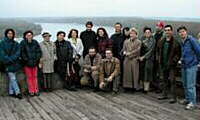 |
| NGO activists attending an international training course at the Morava River Floodplains near Bratislava (SK). |
The Danube Environmental Forum (DEF) was created in 1999 as a network of non-governmental organizations (NGOs) from all Danube River Basin countries. DEF is committed to protecting the natural resources of the Danube region and promoting and implementing ecological practices for the conservation and management of ecosystems. DEF’s special mission is to enhance cooperation and encourage communication between local and national NGOs, governments, businesses and local population by creating opportunities for an exchange of ideas and information between the participating countries. Each of the 13 DEF countries has a National Focal Point responsible for coordinating communication and activities of other DEF member organizations nationally. Since information flow and public participation are very important in making decisions on water management in the Danube, DEF will strive to further these processes.
Awareness raising
The 1st General Assembly brought together NGO representatives from 13 countries: Germany, Austria, Czech Republic, Slovakia, Hungary, Slovenia, Croatia, Bosnia-Herzegovina, Yugoslavia, Bulgaria, Romania, Moldova and Ukraine. The General Assembly was successful in establishing DEF's development strategy and deciding on upcoming actions. It was decided that DEF/NGO actions in the coming year should at the national level raise awareness about problems related to the Danube and encourage other national NGOs to contribute to the protection of the Danube. Future actions will include a publication on nutrient reduction, a bi-yearly newsletter, updates and development of the DEF website, and national meetings. Following the General Assembly, a two-day International Training Session was held for NGO representatives from 11 countries in order to increase their capacity to address nutrient pollution issues and boost their wetland restoration skills. As a follow-up, countries will have national training sessions in the spring of 2003.
Transboundary cooperation
One of the aims of DEF is to reduce organic pollution in the Danube River
Basin in order to protect the unique ecosystem of the Black Sea. DEF is
in the process of expanding the network to include cooperation with the
Black Sea NGO Network. The DEF focuses on reinforcing information exchange
and co-operation among international bodies, governments, national institutions,
the NGO community and the public sector. Through this cooperation, combined
efforts will support sustainable development in the Danube River Basin.
Currently DEF has observer status with the ICPDR and would like to further
develop cooperation at both the regional and the national levels.
Many of DEF’s current activities are supported by funds from Phase
1 of the UNDP/GEF Danube Regional Project (DRP). DEF activities will include
disseminating information, encouraging communication between various groups
of stakeholders, and providing training courses. Its main activities within
the project will involve organizing consultation meetings and training workshops
on nutrient reduction, publishing special NGO publications on nutrients
in 11 national languages, organizing capacity building workshops as well
as cooperating on national projects on nutrient reduction and other priority
actions in the frame of the DRP Small Grants Program. The DRP also provides
support to further develop the DEF network i.e. supports its operations,
communication, activities and information management.